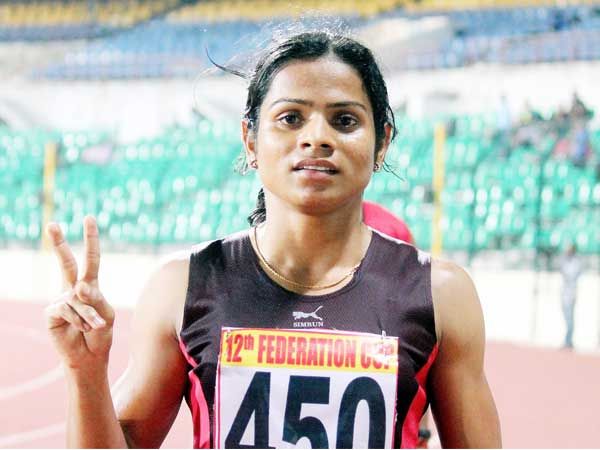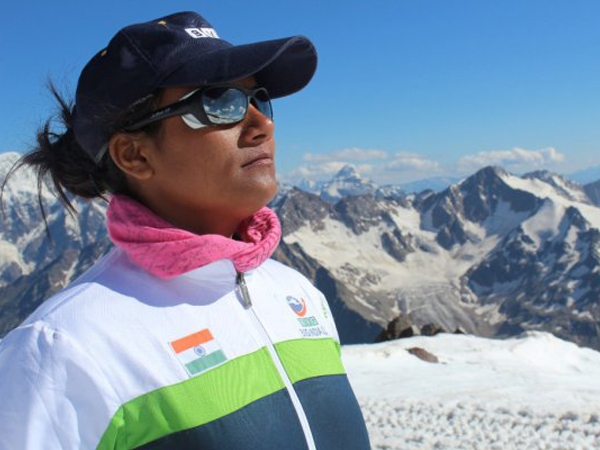
2014 was probably one of the worst years in the life of 19-year-old Indian sprinter Dutee Chand. The International Association of Athletics Federations crushed her dream of winning a medal at the Commonwealth Games (2014), but they could do little to crush her spirit and confidence. Is it passion, perseverance or mental strength? National champion Dutee Chand tells us what it takes to win-on the track and in life.
Dutee’s earliest memory of running goes back to the time when she watched her elder sister training for running, on the fields, in her village Gopalpur, Odisha. “My sister was an athlete. Every time she came home during her break, I would accompany her. Initially, I took part in school sports, but gradually, my sister encouraged me to take it up professionally. I joined the Orissa State Government Hostel; the training was free and soon I was bringing home medals,” says Dutee.
Dutee’s family consists of six sisters, one brother and her parents. “My parents are weavers. They worked very hard to give us our daily food. When my elder sister decided to pursue sports, she faced a lot of music at home. We didn’t have a TV in our village, so no one understood the value of sports. But my sister convinced my parents that participating in sports would mean a secure job in the government. Eventually, they agreed; she became an athlete and is now a constable in Orissa police,” shares Dutee, who simply followed in her sister’s footsteps.
Dutee was never keen on academics; all she dreamt of was running for India. “I have secured medals everywhere,” says Dutee, who is now pursuing a B.LLB from KIIT University.
But for Dutee, challenges were aplenty. To begin with, her village didn’t have any ground. Sometimes, she would run by the river, or on the road or on the highway, where she became the victim of a lot of unwarranted comments from passersby. Also, running shoes were a thing of luxury, for her. “I used to run barefoot, wearing a frock. During the rains, I used to run on stones and puddles. Sometimes, the men on the bike would tell me, ‘aaja bike mein aaja, kyun bhag rahi hai?’ (come sit on the bike, why are you running?). I used to wake up at 3.30am to run by the river and when I was done at 6 am, the women who came to wash their clothes would taunt, ‘kya milega bhaag ke?’ (what will you achieve by running?). But nothing dampened her spirit. She was running ahead, ahead of everything and everyone.
But ‘grace’ came in the form of her sister’s coach Nagpuri Ramesh who offered to train Dutee, pay for her food and accommodation and prepare her for the national level. In 2012, she became a national champion in the under-18 category when she clocked 11.8 seconds in the 100 meters event.
Little did this teenage sprinter know that life was going to put her through an acid test. In July 2014, the Athletics Federation of India banned her from participating in the Commonwealth Games, as tests had shown naturally occurring higher levels of testosterone in her body. “Initially, I didn’t even know why I was banned, I never doped. I got to know about the gender test through newspapers. I was upset that the department for which I got so many medals was blaming me.” What did Dutee do? Besides staying with the pain and praying to God, Dutee decided to fight for justice. She took the matter to the Court of Arbitration of Sport (CAS) against a) Athletics Federation of India and b) International Association of Athletics Federation.
Fortune favours the brave may be a frayed expression, but not for Dutee. On July 27, 2015, she recorded the biggest victory of her career in Switzerland. After the final appeal, the Court of Arbitration for Sports (CAS) not only reversed the ban imposed upon her, by the International Association of Athletics Federations (IAAF), on account of her high testosterone levels, the court even suspended the federation’s hyperandrogenism policy, which allows it to ban female athletes with high testosterone levels.
“Today, all that hard work is paying off. I fought for myself, but all the other female athletes benefitted from this,” says Dutee, who is currently in Hyderabad training for 2016 Rio Olympics.
Dutee derives her mental strength from physical training. “Regular training and practice ensures constant energy flow in the body. That is why I am strong mentally,” she shares.
“In India, women go through a lot of mental torture in sports. When I started running professionally, I was humiliated. But if you can and are willing to bear the pain, there will be nothing to stop you from reaching the heights of success. Opportunities are many, but be mentally prepared for the worst,” says this wise teenager.
Her dream? “My sister couldn’t win the gold medal at the Commonwealth Games, I want to win it for her. I have left it to God to fulfil my dream.” The next obvious question-do you believe in God?
“Absolutely. I see God everywhere; on the track I run, the sea, water, air… He is everywhere.”
All of 19, Dutee’s life lessons have been far more than an average urban teenager. “Life has taught me to be strong and have faith, never be nervous and most importantly I have learned to live. Remember that your hard work will bear sweet fruit when the time is right. So keep working,” says Dutee, echoing the words of Sri Krishna to Arjuna in the Bhagavad Gita.
Having tasted a fair deal of success, Dutee doesn’t equate victory with merely winning medals. “When the world learns from you and gets inspired by you, wohi jeet hai (that is real victory),” she emphasises.
A typical day in Dutee’s life begins at 5 am. She trains for about six hours a day, with regular intervals. And somewhere in between those breaks, she strikes a balance between training and pursuing a degree in law.
So then what does freedom mean to this young girl who rose from the modest soils of India? “I believe that no one has got freedom yet-men or women. We are still bound by so many rules and regulations. How are are we free?”
Her parting words leave me wondering if it would be then right to say that freedom comes with a caveat- ‘Terms and Conditions Apply’.




